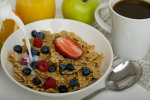If you’ve already polished off the Christmas chocolates then now is the time to learn how to curb your cravings. Follow these top tips to make sure you don’t pile on the pounds over the festive season.

Change your diet
There are many reasons why we all suffer sweet cravings at one time or another - but more often than not it’s because we are lacking something in our diet.
A recent study by U.S. researchers found that teenagers who skipped breakfast were prone to obesity but those who ate a protein-rich breakfasts were found to have less food cravings and were less likely to overeat later in the day.
They concurred that eating a high protein breakfast increased levels of the brain chemical dopamine, the 'feel-good' messenger that regulates food intakes and cravings.
The study's leader, Professor Heather Leidy, of the University of Missouri-Columbia, said: “Our research showed people experience a dramatic decline in cravings for sweet foods when they eat breakfast.
“However, breakfasts that are high in protein also reduced cravings for savoury - or high-fat - foods.
“On the other hand, if breakfast is skipped, these cravings continue to rise throughout the day.”
If you struggle with cravings, try changing your eating habits and eat little and often. This helps keep your blood sugar level stable and eliminates your body’s need for a quick sugar fix.
Adding more substance to your lunch can also help. According to Yale researchers, when women add three ounces of meat, poultry or fish to their lunch, they eat 31 per cent fewer sugar calories during the rest of the day.
Take your mind off it
It can be hard to focus on anything else when a craving strikes, so try going for a walk or doing a workout. Not only will this give you something else to focus on but it will also release endorphins, the same as those released from sweets and treats, to leave us feeling more calm and relaxed.
Walking after a meal is the perfect alternative to a desert and will also help you burn off some of the calories consumed during your meal.
If after trying everything else the cravings are still there, then try brushing your teeth or gargling with mouthwash. As well as the minty flavour, the aftertaste never mixes well with sweets and you should lose your craving.
A little of what you like…
Every now and again the best way to combat a craving is to give in to it, but only in moderation. If you are going to completely fall off the wagon then this option is not for you, but if you want a treat then make sure you go for quality over quantity.
One square of a high quality, high cocoa chocolate bar should curb any craving and is better for you, and lower in calories, than a regular bar.
If you want to create your own snacks so you don’t have to face temptation too often, you can try covering nuts or dried fruit in chocolate or mix the healthier snacks with chocolate chips.
By treating yourself you avoid the feeling of missing out which is often the reason for dieters failing.
Go cold turkey
If you are not the type of personality to be able to stop after one piece of chocolate or a handful of nibbles then the best option to get rid of your sweet tooth is to go cold turkey and cut out sugar completely.
If you can manage 72 hours sugar-free then you will find that not only do the cravings die down but your taste buds will adjust and many things will become too sweet.
Be prepared though as you can feel tired, so if you are going to give it a go it is essential to eat properly to keep your energy levels up.
Change your perfume
We know how a smell can influence our taste buds, even sometimes making us hungry when we thought we were full, but researchers, at St George’s Hospital in London found that the smell of vanilla can have the opposite effect and actually reduce cravings.
Researchers tested a skin aroma patch that releases the aroma of vanilla and found that the test group lost an average of 5lbs a month compared to the placebo group, which lost an average of just 2lbs.
Evidence showed that those wearing the vanilla aroma patches also reported a positive eating change in their diet and felt more in control of what they ate.








![Cures for colds and blocked noses! [REX] Cures for colds and blocked noses! [REX]](https://s.yimg.com/bt/api/res/1.2/xwXXuz1Y3c2lwrcy6y7VHg--/YXBwaWQ9eW5ld3M7cT04NTt3PTYzMA--/http://l.yimg.com/os/publish-images/lifestyles/2014-12-16/b009e380-8530-11e4-adbc-d71c0ad90086_rexfeatures_4101123cb.jpg)
![Simple steam inhaler [Medisure] Simple steam inhaler [Medisure]](https://s.yimg.com/bt/api/res/1.2/kX3gid_wAruIgDZAXG8G4A--/YXBwaWQ9eW5ld3M7cT04NTt3PTYzMA--/http://l.yimg.com/os/publish-images/lifestyles/2014-12-16/30f805d0-8531-11e4-adbc-d71c0ad90086_Screen-Shot-2014-12-16-at-2-37-51-PM.png)
![A hot shower can make you feel better for a number of reasons [REX] A hot shower can make you feel better for a number of reasons [REX]](https://s.yimg.com/bt/api/res/1.2/d9jVgTAfpyHmG3sB0_zMZA--/YXBwaWQ9eW5ld3M7cT04NTt3PTYzMA--/http://l.yimg.com/os/publish-images/lifestyles/2014-12-16/472ce0e0-8532-11e4-bc14-cf26307ca5ee_rexfeatures_3160451a.jpg)
![Just knock it back! [REX] Just knock it back! [REX]](https://s1.yimg.com/bt/api/res/1.2/Syh8pdu1dy2L3foSKaxT7g--/YXBwaWQ9eW5ld3M7cT04NTt3PTYzMA--/http://l.yimg.com/os/publish-images/lifestyles/2014-05-20/279cf000-e00d-11e3-a11b-b176b0f91ff7_Onion-stock-image.jpg)
![Rub on their feet to get them to sleep [REX] Rub on their feet to get them to sleep [REX]](https://s3.yimg.com/bt/api/res/1.2/Xe6VmaQ2ESvauI9FH795MQ--/YXBwaWQ9eW5ld3M7cT04NTt3PTYzMA--/http://l.yimg.com/os/publish-images/lifestyles/2014-12-04/8d936e60-7ba4-11e4-972a-679537c38224_Newborn-baby.jpg)